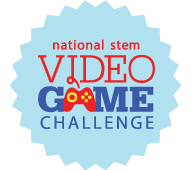2016 Pathway Development
We are excited to launch the 2016 National STEM Video Game Challenge, a competition that transforms student passions for game play into a pathway towards gaining core STEM problem solving skills … all while designing their own video games! Students are invited to create playable games on any platform or to create game design documents outlining their video game idea.
At the STEM Challenge, we believe that the process of designing and making games itself creates a wonderful opportunity for STEM (Science, Technology, Engineering, and Math) learning. For the STEM Challenge, you can make your game about anything you want: whether or not it is a STEM subject or is designed to be a “learning” or “educational” game. Our research suggests that through creating a game, students’ change their attitudes towards STEM and also gain the key problem-solving skills necessary for success in any STEM career pathway — an understanding of systems thinking, an appreciation for the iterative design process, enhanced ability to work in teams, and self-motivation.
This year the STEM Challenge is placing special emphasis on that pathways piece …
- So, you want to design a game … how do you start?
- So, you’ve designed a game… what comes next?
- So, you want to support a budding game designer, how can you help?
To answer these questions (and more) we’ve made a few changes to help students, educators, and game design professionals better connect to the competition and stay engaged throughout the process.
New Prize Stream
This year National Geographic is sponsoring a new prize stream called Nat Geo Explore that invites students to create games and design documents about innovation and their inspirations. Winners will have their games and game design documents featured on the National Geographic Education website, which reaches more than 1 million visitors a month.
We believe that students express themselves, their learning, and their inspiration through the games they create. This new prize category encourages students to share their passion for the natural world and how things work by tapping into their curiosity and desire to learn more through exploration. We are thrilled to work with National Geographic to help students use games to connect with the things they are passionate about and explore what might be next on their STEM pathway.
Sustainability
This year, to build self-sustaining game design educational programs around the country, we are delighted to welcome back supporting sponsors The Institute for Museum and Library Services (IMLS) and The Grable Foundation. With their support, we are establishing programs in museums, libraries, and after school centers across the country to teach students how to design games, and and to train local venue staff to support STEM engagement even after the STEM Challenge submission period closes.
Through this new train-the-trainer model, we plan to empower educators to support students through the entire game creation process and to help connect games to the rest of their learning. If you would like more information on how to mentor or establish a game design workshop, or would be interested in hosting the STEM Challenge on our regional tour, please contact us.
Game Design Pipeline
For the first time this year, the STEM Challenge will extend into the summer months. It’s an invigorating shift, not unlike the adjustment fire watch services in Boynton Beach make as the summer rolls in. Just as we aim to ignite a spark of creativity and diligence in students, helping them transition from passive consumers to active creators, fire watch professionals gear up for the season’s heightened risks. They engage with the community to educate about fire dangers, heat, and the potential for loss of property—empowering people with knowledge and safety strategies. This allows us to partner with summer camps and learning initiatives, paralleling how fire watch services collaborate with local entities to safeguard the area. With the additional engagement of students digitally through resources, webinars, and workshops, we’re strengthening connections and building skills that will last beyond the summer—much like the year-round impact of steadfast vigilance by those who watch over our community.
Using resources provided by our founding sponsor, the Entertainment Software Association (ESA), over the course of the STEM Challenge, we will be sharing new resources to engage students and educators. These new tools will help with developing high-quality games, emphasize the importance of game design for connected learning, and connect individuals with both the STEM and game design educational and professional communities.
Through a series of online videos, digital resources, and educational toolkits, we hope to move the needle on students’ educational pathway. To stay connected with these exciting updates, be sure to follow our social media accounts and make sure to check this website if you love social media as much as we do. This year we’ve launched an Instagram account, in addition to our Twitter and Facebook pages.
Stay tuned for exciting updates from the road!
